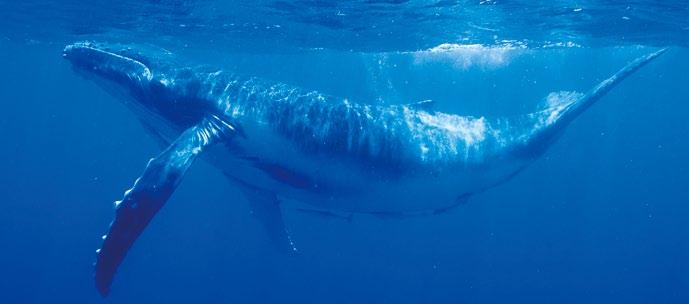
4 minute read
The way forward
©Greenpeace / Jeremy Sutton-Hibbert
A) Policy loophole
The Korean government has taken a number of steps to illegal whaling and illegal trade of whale products in recent
years, e.g. collecting DNA sample of all auctioned bycatch and issuing Cetacean Trade Certificate. Although these new
regulations have so far been assessed as ineffective in implementation, this can be improved if the relevant authorities
keep making efforts. While more push at implementation level is needed, there are loopholes in the regulation system
that need to be closed in order to tackle the two main problems: high number of bycatch and significant level of illegal
whaling.
The current system provides local fishermen with incentives to have whale bycatch by giving ownership to the person
who secures the dead whale first. It is likely to encourage fishermen either to regard a dead whale in their fishing nets
as desirable or to disguise deliberate hunting as bycatch by any possible means. There is no way to distinguish whether
a whale is genuinely bycaught or deliberately killed if, for example, a fisherman left a whale to die instead of releasing
it when it is entangled. The current system is not only threatening whale stocks but also tempting innocent fishermen
to become criminals.
B) Recommendations
·The practice of giving dead whales to finders should be ended and dead whales should not be brought to shore.
·Financial incentives should be given to release whales alive when possible.
·There should be mandatory registration for whale meat restaurants so consumption can be better tracked.
·Given the high value of whale meat, penalties for illegal whaling should be increased to deter this sort of crime.
·All the cetacean species listed in CITES Appendix I or II should be formally protected by the Korean government. 24
Conclusion
Korea has a domestic law that bans whaling. Korea also has the responsibility to mitigate bycatch as a party to the
IWC. However, it is letting these happen by not implementing its own law properly and by leaving the loopholes to be
abused. The Korean government should strengthen the level of monitoring, control, and the surveillance in order to
implement the relevant policy / law properly. If it cannot control illegal and unsustainable activities in its own water, what
are the chances that it can control its own vessels in distant waters. Korea needs to put the utmost effort to save the
oceans and marine ecosystem that are destroyed by overfishing due to lack of proper management of fishery. And the
1 2 3 4 5 6 7 IUCN statement at http://cmsdata.iucn.org/downloads/iucn_position_on_scientific_whaling_in_korea_13_july_2012.pdf
Anonymous. (2005). “Whaling Industry of Korea.” 2007, Jangsaengpo Whale Museum.
Doopia cited from http://100.naver.com/100.nhn?docid=730601, accessed on 27 Feb 2012.
'The History of Modern Whaling', J.N Tonnessen and A.O. Johnsen, 1982, IBSN 0-905838-23-8
'The History of Modern Whaling', J.N Tonnessen and A.O. Johnsen, 1982, IBSN 0-905838-23-8
IUCN statement at http://cmsdata.iucn.org/downloads/iucn_position_on_scientific_whaling_in_korea_13_july_2012.pdf
Kim, Z. G. (1999). "By-catch of Minke whales in Korean waters." Journal of Cetacean Research and Management
1 (Suppl.): 98-100. 8 Hankook Ilbo, 21 Feb, 2012. Accessed on 28 Feb 2012 from http://news.hankooki.com/lpage/society/201202/
h2012022115421921950.htm 9 IWC (2007). “IWC Member nations and commissioners.” Retrieved 2 May, 2007, from http://www.iwcoffice.org/
commission/members.htm. 10 Baker, C. S., Lukoschek, V., et al. (2006). Incomplete reporting of whale, dolphin and porpoise ‘bycatch’ revealed
by molecular monitoring of Korean markets. Animal Conservation 9: 474-482. 11 Jeong, J. R. and G. C. Hwang (2005). Whaling, resume or not? Dong A Daily. 12 Mok, S. G. (2006). Catch whaler!, Hankook Daily. 13 Ulsanpress (2010). Lifting whaling ban to stop the side effect of illegal whaling, 11 Jul 2010, Ulsanpress (local media),
ROK. Retrieved 18 Oct 2010 from http://www.ulsanpress.net/news/articleView.html?idxno=56869. 14 Jeong, J. R. and G. H. Lee (2006). Whales of East sea, scared of fishing nets. Dong A Daily. 15 Confiscated and provided as legal supply to the market 16 IWC (2009). Report of the Scientific Committee, Annex J: Report of the working group on estimation of bycatch and
other human-induced mortality. Retrieved 6 Dec 2010 from http://iwcoffice.org/_documents/sci_com/SCRepFiles2009/
Annex%20J%20-%20Final-sq.pdf. 17 Kim, Ma Seon (2010), War against illegal whaling in order to secure whaling quota from the IWC., BusanIlbo (regional
media). 18 MBC (2010). Illegal whaling rampant… fishermen calling for culling, 28 July 2010, MBC (National media), Republic of
Korea. Retrieved on 4 Nov 2010 from http://imnews.imbc.com/replay/nwtoday/article/2667595_5782.html. 19 SBS (2008). Illegally killed and sold whale meat for 90 whales caught by the police, 18 Mar 2008, SBS (national media),
Korea. Retrieved 26 Oct 2010, from http://news.sbs.co.kr/section_news/news_read.jsp?news_id=N1000391267. 20 KCG (2010). Round up of a gang of whalers and whale meat distributors on the East coast. Media briefing, Retrieved
7 Nov, 2010 from http://www.korea.kr/newsWeb/pages/search/search.jsp?dquery=%EB%8F%99%ED%95%B4%EC
%95%88+%EC%9D%BC%EB%8C%80+%EB%B0%8D%ED%81%AC%EA%B3%A0%EB%9E%98+%EB%B6%88%EB%
B2%95%ED%8F%AC%ED%9A%8D&collection=&chk=true. 21 Compiled from information provided to the IWC by the government of Korea. 22 PR from local government NamGu, “It’s not difficult to taste ‘whale meat’”, http://www.ulsannamgu.go.kr/namgu/
namgu04_10.php?gubun=view&brdId=bodo&bNo=2233&page=11&case=&sear=&deptCode=&type= 23 Kookje Shinmun (2012), Lotto of the sea, skyrocketing price of whales, 19 Feb, 2012, Accessed on 28 Feb 2012
from http://www.pusannews.co.kr/news2011/asp/newsbody.asp?code=0500&key=20120219.99002114645. 24 Ministry of Environment has its own list of endangered fauna and flora (including mammal, avian, reptile, amphibian,
fish, insect, and invertebrate species), but cetaceans are not included here. However, the Ministry defines ‘internationally
designated endangered species’ as the species on the Appendix I, II, and III of the CITES, and all the large whales are
on Appendix I.

Written by HAN Jeonghee For inquiries, contact ekr@greenpeace.org


